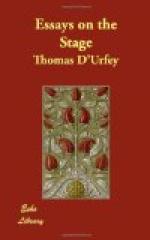I remember, being lately at St. James’s, this very part of the Doctors Book was read or rather spelt out to me, with tickling satisfaction, by one whose Wit and good Manners are known to be just of the same weight, who, since he can be merry so easily, he shall laugh at some of the Reformers Hotch-potch too, as I have mingled it for him. Jewish Tetragramaton, Stigian Frogs, reeking Pandaemoniums, Debauch’d Protagonists, Nauseous Ribaldry, Ranting Smutt, Abominable Stench, Venus and St George_, Juliana, the Witch and the Parson of Wrotham [Footnote: Collier’s Epithetes.], with the admirable Popish story of the Woman that went to the Play-House and brought home the Devil with her_ [Footnote: Collier, p. 257.]—And the Devil’s in’t indeed, if this charming Rhetorick of his, (since he calls mine so) especially joyn’d with that fine story from Tertullian, don’t divert the Ladies as well as t’other; for ’tis very like a Catholick miracle you must know, and the top wit of it is, that when the Parson is Conjuring, he asks the Devil how he durst attack a Christian? who, like an admirable Joker as he was, answers, I have done nothing but what I can justify, for I seiz’d her upon my own ground. Now let the Devil be as witty as he can, I am sure the story, maugre Tertullian’s Authority, or the Doctor’s either, is confounded silly, and downright nonsense, what credit soever it has with him for its likeness to Jesuiticism. And now I think I have prov’d too, that a Clergy man can speak nonsense, pass it for humour too, and gratify his ease and his malice at once, without a Poet’s putting his into his Mouth. And since we have been speaking of quibbling, I shall digress a little to entertain the Reader on that subject. Our Critick rallies Mr Dryden’s Sancho in Love Triumphant, for saying, dont provoke me, I’m mischievously bent, to which Carlos a man of sense replys, nay you are bent enough in conscience, but I have a bent Fist for Boxing; Here says he (smartly) you have a brace of quibbles started in a line and a half [Footnote: Collier, p. 170.]—Very true, you have so—But suppose quibbling or punning—but I think this is call’d punning—Is this Gentlemans humour—if so, being a Soldier, I don’t see it calls his sense in question at all—but now pray let’s see, how our Critick manages a quibble, with a blunder tack’d to the Tail on’t, in the page before, there, in the aforesaid Play, Celidea in a passion cries,
Great Nature break thy Chain that links
together
The Fabrick of this Globe, and make a
Chaos,
Like that within my Soul—
[Footnote: Collier, p. 68.]
Now, says the Doctor, keen as a Razor, if she had call’d for a Chair, instead of a Chaos, tripp’d off, and kept her folly to herself, the woman had been wiser. Calling for a Chair instead of a Chaos is an extreme pretty Quibble truly—but if the Critick had let the Chair-men have tripp’d off with her, instead of doing it herself as she sat in a Chair, I’m sure the blunder had been sav’d, and I think he had exprest himself a little wiser than he has—And come, now my hand’s in, let’s parallel Mr Dryden with our Reformer a little longer—Church-men (says Benducar in Don Sebastian,




